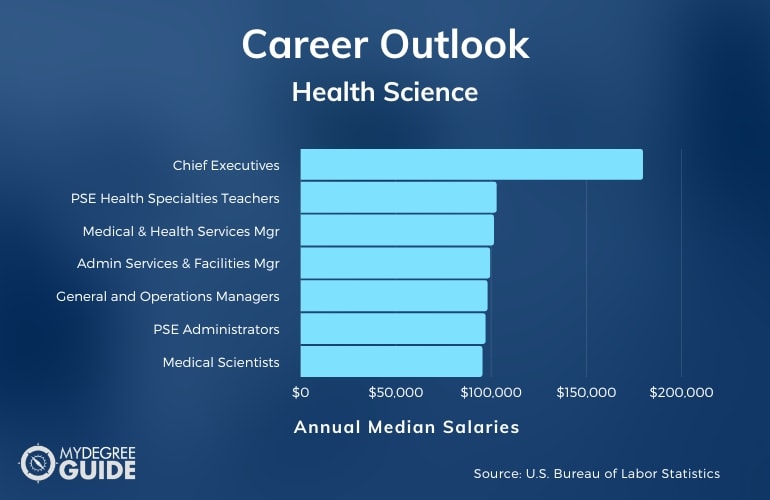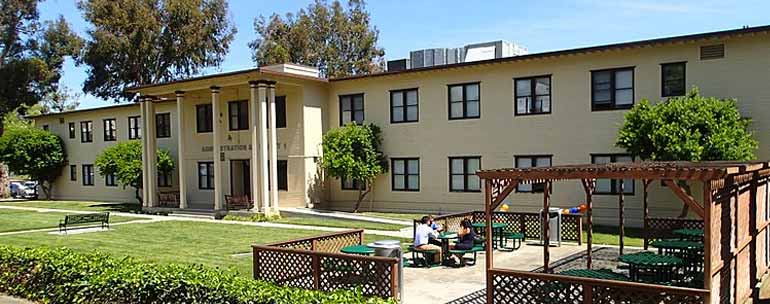If you’re a healthcare professional desiring to advance your career as an educator, researcher, or administrator, you might consider earning a Doctor of Health Science.

This doctoral program can help provide graduates with advanced conceptual, analytical, leadership, and teaching skills that are needed to navigate dynamic and complex healthcare challenges. This could also be a rewarding degree path for health practitioners who want to move into leadership or academic roles.
Editorial Listing ShortCode:
Health science doctorate programs offer a range of concentrations so you can focus on the specialty area of your choosing.
Doctor of Health Science Programs Online

Earning a Doctor of Healthcare Science is a strategic way for healthcare professionals to expand into leadership roles in clinical practice, healthcare administration, research, or education.
Doctor of Health Sciences programs is designed to equip graduates with diverse knowledge of the healthcare field, including:
- Research design
- Medical writing skills
- Health information literacy
- Health analytics
- Evidence-based practice
- Health systems
- Health policy
- Stakeholder processes
Students in Doctor of Health Science online programs learn how to conduct high-level research, evaluate and synthesize data, and apply evidence to their practice.
Editorial Listing ShortCode:
You can also grow your capacity to navigate complex healthcare challenges at a local and global level. Some professionals may even go on to influence global healthcare systems, depending on their chosen concentration. Advanced expertise in this field could lead to rewarding careers in leadership, advocation, and influence of healthcare systems.
Many DHSc graduates also go on to educate in postsecondary teaching positions as well as in clinical and community settings. Others assume leadership positions in various sectors of the healthcare field, including healthcare organizations, public health agencies, and universities. Their expertise may be used to transform healthcare systems and patient outcomes.
Common Online Doctor of Health Sciences Concentrations

Health science is a broad field, which is why, much like with an online masters in health science degree program, online Doctor of Health Science programs allow you to choose a concentration or specialty. Common health science concentrations include:
- Education in Health Care. This concentration is designed to prepare students with the necessary skills to succeed in the academic arena, such as postsecondary teachers or education administrators. Focus is given to high-level research, communication, problem-solving, ethics, knowledge application, and more.
- Telehealth. This concentration is designed to prepare students to utilize telehealth to provide quality care. Topics of study will include telecommunications, information systems, e-health, mobile health, and more.
- Global Health. This concentration is designed to prepare students to enter into healthcare leadership, education, and research at the global healthcare level.
- Epidemiology. The epidemiology concentration focuses on infectious diseases and prevention, and it may include deeper studies in human pathology and physiology.
- Nutrition Science. This concentration is designed for students desiring to work in nutrition, such as dietitians or nutritionists. The focus will be on food science, chemistry, biology, and nutrition.
The concentration you choose may depend on your current or desired field, and your dissertation or capstone project will likely relate to this specialty.
Health Science Careers and Salaries

Doctor of Health Science programs provides a broad knowledge base to prepare graduates for healthcare leadership roles, enabling them to put research into real-world practice.
A DHSc may help healthcare professionals achieve leadership roles in clinical, research, and educational settings. Those in healthcare administrative or executive roles may supervise healthcare delivery and oversee systems in clinical settings. This could include managing specific departments or entire organizations.
According to the Bureau of Labor Statistics, here are the median wages for positions related to health science and healthcare leadership.
| Careers | Annual Median Salaries |
| Chief Executives | $179,520 |
| Postsecondary Health Specialties Teachers | $102,720 |
| Medical and Health Services Managers | $101,340 |
| Administrative Services and Facilities Managers | $99,290 |
| General and Operations Managers | $97,970 |
| Postsecondary Education Administrators | $96,910 |
| Medical Scientists | $95,310 |
| Epidemiologists | $78,830 |
| Environmental Scientists and Specialists | $76,530 |
| Social and Community Service Managers | $74,000 |
Graduates may also be presented with opportunities for clinical research positions at universities, private and government laboratories, and hospitals.
Editorial Listing ShortCode:
Another major career path for graduates of DHSc programs is in university-level education. Graduates may also have the opportunity for administrative positions in educational settings, such as that of a dean or department head.
Online Doctor of Health Science Curriculum & Courses

The coursework for different Doctor of Health Sciences programs can vary depending on your school and chosen concentration. Regardless, you may find that many curriculums feature courses that are similar to the following:
- Healthcare Communication: This course is designed to prepare you with the communication skills needed to communicate with large organizations, employees, and more.
- Medical Writing: This course covers how to prepare documents and write sufficiently for publication in medical journals or clinical case reviews.
- Epidemiology: This course focuses on global health strategies for disease prevention as well as care for common global disease concerns, such as cancer.
- Healthcare Ethics: This course goes over the core morals present in healthcare and their alignment with the law, and it also explores ethical considerations in areas like cloning, organ transplantation, and more.
- Principles of Management: This course overviews the principles of management and decision-making in the field of healthcare, including strategies for planning, communication, organization, and human resources.
- Risk Management for Health Professionals: This course provides an introduction to risk management in the healthcare system, as avenues for quality improvement are discovered and tested.
- Healthcare Information Systems: This course explores the role of technology and specified information systems in operations, patient care, quality, and other aspects of the healthcare system.
- Research Methods, Design, and Analysis: This course dives into research methodology and design as well as approaches to examining problems.
- Healthcare Outcomes: This course focuses on the methods and strategies to evaluate healthcare and patient outcomes alongside strategies for continuous improvement.
- Evidence-Based Practice: This course covers the best methods for integrating high-quality research with clinical expertise, and it exposes students to the appraisal of study quality and design.
Curriculum also often requires the completion of a dissertation or capstone project.
Admissions Requirements

Admission requirements for DHSc programs can vary depending on your school, but here are some common requirements for admission.
- Academic transcripts
- Master’s degree in a related field from an accredited university
- Letters of recommendation
- Minimum cumulative GPA of 3.0, on average
- Prior healthcare experience
A growing number of schools no longer require GRE or GMAT scores, but some still do. You can visit the websites of your prospective schools to discover their specific admissions criteria.
Accreditation

Before applying to a college or university, it’s important to verify whether it’s regionally accredited. Regional accreditation is considered the most widely recognized accreditation, ensuring that your school meets quality standards for higher education.
Editorial Listing ShortCode:
The accreditation status of your school can impact not only your ability to receive financial aid but also your future employment opportunities. You can verify your school’s accreditation status by visiting the website of the Council for Higher Education Accreditation (CHEA).
Financial Aid and Scholarships

Many students looking to complete a Doctor of Healthcare Science degree online also seek financial aid. Luckily, there are several aid options available to students who qualify.
Federal aid can be offered in the form of student loans, grants, and work-study programs. To determine your eligibility for federal aid, you can submit the Free Application for Federal Student Aid (FAFSA). Loans and grants may also be offered at your state level, depending on where you live or where your school is located.
You can see if you’re eligible for private grants and scholarships from various institutions as well. Your school may also offer financial aid opportunities specifically for doctoral students. In addition, many companies offer programs that are designed to fund employee education. If you’re currently employed, you can talk to your HR department to learn about your options.
What Is a DHSc Degree?

A DHSc (Doctor of Health Science) degree is designed to prepare healthcare professionals to enter leadership roles in healthcare administration and education. This degree offers a core focus on leadership skills, research design and application methods, evidence-based practice, healthcare delivery and policy, and more.
Students typically have experience as a healthcare professional or practitioner before enrolling. You may also be required to hold a master’s degree in a related field. Most programs allow you to specialize in a concentration that aligns with your goals. Different programs can have different concentration offerings.
What Can You Do with a Doctor of Health Science Degree?

A Doctor of Health Science can help prepare healthcare professionals for advanced leadership roles in healthcare settings. This may include overseeing a department or entire healthcare facility.
It can also help graduates qualify for positions as researchers in clinical settings at universities or within governmental or private laboratories. Graduates may also pursue postsecondary education opportunities, such as becoming a professor or administrator of a university health department.
Current healthcare practitioners, such as nurses, dietitians, and physician’s assistants, may also seek promotion into leadership roles after obtaining a Doctor of Health Science degree.
How Long Does It Take to Get a Doctor of Health Sciences Online?

Generally, a doctoral program takes 3 to 5 years to complete with full-time study. The total time depends on your program’s required number of credit hours and whether there’s a dissertation component.
Editorial Listing ShortCode:
Most Doctors of Health Science programs require a dissertation or capstone project, which may take 1 to 2 years to complete. If no dissertation is required, a doctoral program can generally be completed in 3 years with full-time study. Of course, if you are studying part-time, completing the program may take longer than average.
What’s the Difference Between a Health Science PhD vs. Doctor of Health Science Program?

There are two health science doctoral paths available to students. They may seem similar on the surface, but they differ in their focuses and career objectives.
- PhD in Health Science: This degree path focuses on preparing graduates to become researchers or educators in a specified discipline.
- Doctor of Health Science: This degree path is designed to prepare graduates to become leaders and administrators in healthcare settings, where research can be applied.
Both degree paths focus on research and can lead to educational opportunities, but a DHSc also prepares for leadership positions in organizational settings, emphasizing the application of research.
Is a Doctor of Health Science Worth It?

Yes, a Doctor of Health Science is worth it for many professionals. This degree path can provide a strong base of research, policy, and leadership skills, which may lead to diverse opportunities in many sectors of healthcare.
Editorial Listing ShortCode:
According to the Bureau of Labor Statistics, employment of medical and health services managers is projected to grow 28% over the next ten years. This is much faster than the average growth for all occupations. This degree path can also help healthcare professionals qualify for positions in academia. Some graduates aim to have a tangible impact on public health and policy.
Universities Offering Online Doctor of Health Science Degree Programs
Methodology: The following school list is in alphabetical order. To be included, a college or university must be regionally accredited and offer degree programs online or in a hybrid format.

A.T. Still University offers a Doctor of Health Sciences that can be earned online. The program features four concentrations to choose from Generalist, Fundamentals of Education, Leadership and Organizational Behavior, and Global Health. To graduate, students must complete 70 credit hours, including an applied research project.
A.T. Still University is accredited by the Higher Learning Commission.

Bay Path University offers a Doctor of Health Science that can be earned 100% online. Concentration options include Generalist, Public Health, Health Informatics Management, Leadership and Negotiation, Organizational Excellence in Healthcare, and several more.
Bay Path University is accredited by the New England Commission of Higher Education.

Campbell University offers a Doctor of Health Sciences. The program uses accelerated, 8 week courses that are 100% online and a cohort model. It can typically be finished in 3 years. Potential courses include Health Equity and Wellness, Trends in Health Policy, and Interprofessional Education and Practice. To graduate, students must complete a capstone research project.
Campbell University is accredited by the Southern Association of Colleges and Schools Commission on Colleges.

Drexel University offers an online Doctor of Health Sciences program that is intended for health professionals who aspire to leadership roles. Each course in the program is 10 weeks long. Potential courses include Population Health: An Interprofessional Approach, Foundations in Scholarly Inquiry and Writing, and Foundations in Research Methods.
Drexel University is accredited by the Middle States Commission on Higher Education.

Liberty University offers a Doctor of Health Sciences that can be completed 100% online. The program requires the completion of 60 credit hours and takes on average of 3 years to finish. The program offers students a wide range of elective options and opportunities to participate in a practicum and a research project. Each class is 8 weeks long.
Liberty University is accredited by the Southern Association of Colleges and Schools Commission on Colleges.

Massachusetts College of Pharmacy and Health Sciences offers a Doctor of Health Sciences that can be earned online. This part-time program offers start dates in the fall, spring, and summer. Concentrations are available in Health Systems Administration, Educational Leadership, and Global Health. To graduate, students must complete 54 credits, including an evidence-based healthcare capstone project.
MCPHS is accredited by the New England Commission of Higher Education.

Nova Southeastern University’s Doctor of Health Sciences features three concentration options: Education in Health Care, Global Health, and Telehealth. The program is mostly online but does include weeklong summer seminars on campus. Students are also given the opportunity to complete an internship. There are four start dates offered every year.
Nova Southeastern University is accredited by the Southern Association of Colleges and Schools Commission on Colleges.

Pacific University offers a Doctor of Healthcare Science that can be earned completely online. The program is intended for those who already work in a healthcare practice or healthcare education and is mostly asynchronous. To graduate, students must complete 36 credits, including a scholarly research project related to diversity and inclusion in healthcare.
Pacific University is accredited by the Northwest Commission on Colleges and Universities.

Pennsylvania Western University offers an online program for a Doctorate in Health Science and Exercise Leadership that focuses on preventing sickness rather than treating it. The program requires the completion of 48 credits, 53 if the dissertation option is chosen. Dissertations must be defended on campus. New students may start every fall. The program can potentially be finished in 2 years.
Pennsylvania Western University is accredited by the Middle States Commission on Higher Education.

Radford University offers a Doctor of Health Sciences that can be earned 100% online. Most students opt to take two classes each semester, but students may choose courseloads that work for them. Classes are designed to facilitate interaction between students and professors. To graduate, students must complete 42 credit hours, including a capstone project similar to a dissertation.
Radford University is accredited by the Southern Association of Colleges and Schools Commission on Colleges.

Thomas Jefferson University offers a Doctor of Health Science that can be earned online. The program usually takes 3 to 4 years to complete and is designed to accommodate the schedules of working healthcare professionals. Students can choose between a Clinical Leadership track and a Health Professions Teaching and Learning track.
Thomas Jefferson University is accredited by the Middle States Association of Colleges and Schools.

Touro University Worldwide offers an online program for a Doctor of Health Science. It requires the completion of 48 credit hours and takes on average 2 years to finish. Classes can be taken in a 100% online, 8 week format, and there are six start dates to choose from every year. Potential courses include Health Informatics, Epidemiology, and US and Global Health Policy.
Touro University Worldwide is accredited by the WASC Senior College and University Commission.

The University of Bridgeport offers a Doctor of Health Sciences that can be earned online. Applications are accepted on a rolling basis for the fall, spring, and summer terms, and students can typically finish in less than 4 years. Potential courses include Fundamentals of Clinical Trials, Healthcare Informatics, and Global Health Issues.
The University of Bridgeport is accredited by the New England Commission of Higher Education.

The University of Indianapolis offers a Doctor of Health Science that can be earned mostly online. The program does require two on-campus sessions at the beginning of the first and second years. Students typically spend 2.5 years completing coursework, and then an additional 1 to 2 years working on a dissertation.
The University of Indianapolis is accredited by the Higher Learning Commission.

The University of South Dakota’s PhD in Health Sciences program is mostly online and designed with working professionals in mind. The program requires the completion of 75 credits, including a dissertation. It features a wide range of elective options and is highly customizable to fit interests and career goals.
The University of South Dakota is accredited by the Higher Learning Commission.
Getting Your Doctor of Health Science Online

Earning your Doctor of Health Science degree online can allow you to grow your professional qualifications as a leader, educator, or researcher in the vast field of healthcare. A growing number of universities also offer online PhD in Health Sciences degree options in addition to the DHSc degree.
Healthcare professionals who are currently employed may find the flexibility of completing this degree online to be a necessary and welcome benefit. If you desire to pursue a leadership position in healthcare or to become involved in clinical research or education, then this degree path may be for you.
You can start exploring DHSc programs from accredited schools today to find the concentration that best suits your interests and goals.

